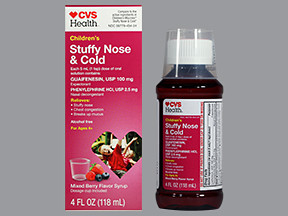GUAIFENESIN/PHENYLEPHRINE - ORAL
PHONETIC PRONUNCIATION: (gweye-FEN-eh-sin/fen-ill-EFF-rin)
COMMON BRAND NAME(S): Endal, Numonyl, Sinupan
GENERIC NAME(S): guaifenesin/phenylephrine HCl
Uses
USES: This combination medication is used to temporarily treat cough and runny/stuffy nose (nasal congestion) caused by infections (such as the common cold), allergies (such as hay fever), and other breathing illnesses. This product is usually not used for ongoing cough from smoking or long-term breathing problems (such as chronic bronchitis, emphysema) unless directed by your doctor. Guaifenesin is an expectorant. It works by thinning and loosening mucus in the airways, clearing congestion, and making breathing easier. Phenylephrine is a decongestant (sympathomimetic). It reduces nasal congestion by narrowing the blood vessels in the nose. If you are self-treating with this medication, it is important to read the package instructions carefully before you start using this product to be sure it is right for you. (See also Precautions section.) Cough-and-cold products have not been shown to be safe or effective in children younger than 6 years. Therefore, do not use this product to treat cold symptoms in children younger than 6 years unless specifically directed by the doctor. Some products (such as long-acting tablets/capsules) are not recommended for use in children younger than 12 years. Ask your doctor or pharmacist for more details about using your product safely. These products do not cure or shorten the length of the common cold and may cause serious side effects. To decrease the risk for serious side effects, carefully follow all dosage directions. Do not give other cough-and-cold medication that might contain the same or similar ingredients (see also Drug Interactions section). Ask the doctor or pharmacist about other ways to relieve cough and cold symptoms (such as drinking enough fluids, using a humidifier or saline nose drops/spray).
How to use GUAIFENESIN/PHENYLEPHRINE - ORAL
HOW TO USE: Take this medication by mouth with or without food, as directed by your doctor. If you are self-treating, follow all directions on the product package. To prevent trouble sleeping, do not take this medication close to bedtime. If you are uncertain about any of the information, ask your doctor or pharmacist. Dosage is based on your age, medical condition, and response to treatment. Do not increase your dose or take this drug more often than directed. Guaifenesin may have a bitter taste. Swallow capsules and tablets whole. Scored tablets may be split for lower doses. Chewable tablets may be swallowed whole or chewed. Drink plenty of fluids while taking this medication. Fluids will help to break up mucus and clear congestion. If you are using the liquid form of this medication, carefully measure the dose using a special measuring device/spoon. Do not use a household spoon because you may not get the correct dose. If your liquid form is a suspension, shake the bottle well before each dose. Tell your doctor if your condition is accompanied by fever, severe sore throat, rash, persistent headache, or if it persists, returns, or worsens after 7 days. These may be signs of a serious medical problem. Seek immediate medical attention if you think you may have a serious medical problem.
Side Effects
Precautions
Interactions
Overdose
Images
Reviews
Faq for GUAIFENESIN/PHENYLEPHRINE - ORAL
Guaifenesin/Phenylephrine is an oral medication commonly used to relieve symptoms associated with congestion, coughing, and nasal congestion caused by the common cold, allergies, or other respiratory conditions.
Guaifenesin helps to thin and loosen mucus in the airways, making it easier to cough up and clear congestion. Phenylephrine is a decongestant that works by constricting the blood vessels in the nasal passages, reducing swelling and congestion.
The recommended dosage may vary depending on the specific formulation of the medication. It is important to follow the instructions provided by your healthcare provider or the directions on the product label. Do not exceed the recommended dose.
Common side effects may include dizziness, headache, nervousness, nausea, stomach upset, or trouble sleeping. If you experience more severe side effects such as rapid heartbeat, difficulty breathing, or severe dizziness, seek immediate medical attention.
It is important to consult your healthcare provider or pharmacist before taking Guaifenesin/Phenylephrine with other medications. Certain drugs, such as MAO inhibitors or beta-blockers, may interact with Guaifenesin/Phenylephrine and cause potentially dangerous side effects.
Consult with your healthcare provider before using Guaifenesin/Phenylephrine if you are pregnant or breastfeeding. They can weigh the potential benefits against any possible risks to both you and your baby.
The onset of action for Guaifenesin/Phenylephrine can vary, but it typically starts working within 30 to 60 minutes after taking the medication. However, individual response may vary.
Guaifenesin/Phenylephrine may be used in children, but it is important to follow the dosage instructions specifically formulated for pediatric patients. Consult with a healthcare provider to determine the appropriate use in children.
Guaifenesin/Phenylephrine is usually used for a short duration to relieve acute symptoms. If symptoms persist for more than a few days, it is important to consult a healthcare provider for further evaluation and guidance.
Disclaimer
IMPORTANT: HOW TO USE THIS INFORMATION: This is a summary and does NOT have all possible information about this product. This information does not assure that this product is safe, effective, or appropriate for you. This information is not individual medical advice and does not substitute for the advice of your health care professional. Always ask your health care professional for complete information about this product and your specific health needs.


No Reviews Yet